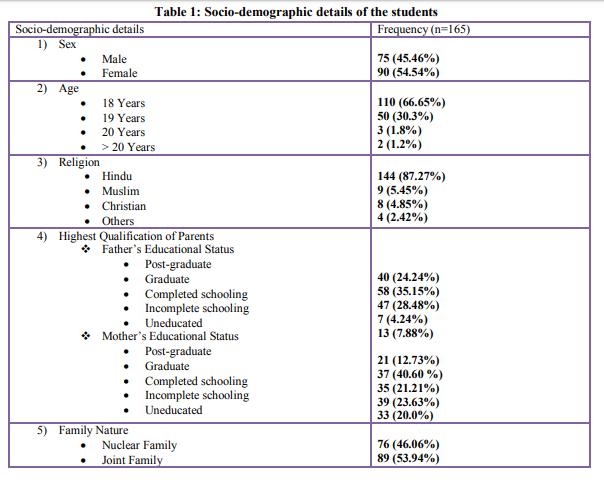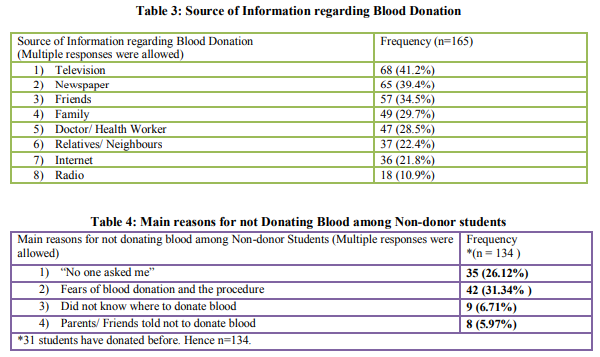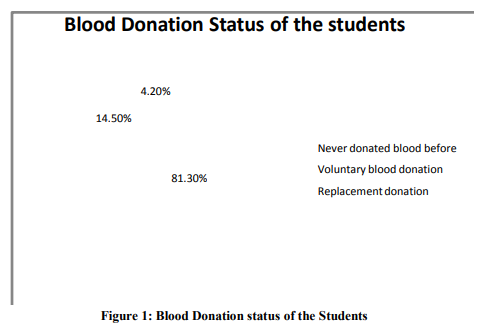IJCRR - 5(12), June, 2013
Pages: 26-31
Date of Publication: 28-Jun-2013
Print Article
Download XML Download PDF
KNOWLEDGE, ATTITUDE AND PRACTICES ON VOLUNTARY BLOOD DONATION AMONG COLLEGE STUDENTS IN BIJAPUR, KARNATAKA
Author: Arun Pulikkottil Jose, M. M. Angadi, K. A. Masali, Sowmya Bhat, Shashank KJ, Prashant Wajantri
Category: Healthcare
Abstract:Background: Blood is scarce. Even with mankind's advances in the field of science, there is still no substitute for blood. Voluntary blood donation is the safest and most ideal method to meet the current shortage we face. College students are a good source of easily accessible, quality blood provided that they are sufficiently motivated and sensitized to the need. Objective: To assess the knowledge, attitude and practices on voluntary blood donation among first year medical college (Allopathic and Ayurveda) students. Materials and methods: The study was conducted on a total of 165 first year students of BLDEU's Shri B. M. Patil Medical College and A. V. S. Ayurveda Mahavidyalaya, Bijapur. A semi-structured questionnaire was used to obtain information regarding knowledge, attitude and practices regarding blood donation. Data was analyzed and presented in the form of percentages and figures. Results: All the students had an incomplete and inadequate knowledge regarding blood donation. Although 87% expressed their desire to donate blood, only 18% had donated before, of which only 14.5% were voluntary blood donations. 18% were not aware of their blood group. 66% felt that donors must be rewarded monetarily. 72% students felt the need of some form of motivation to convince them to donate blood. Conclusion: This study shows that the knowledge, attitude and practices regarding voluntary blood donation is dismal among first year medical students. Measures have to be taken to raise awareness and abolish the myths and fears linked to voluntary blood donation.
Keywords: Knowledge, Attitude, Practices, Voluntary Blood Donation
Full Text:
INTRODUCTION
Science has advanced in leaps and bounds since the dawn of the 20th century. Blood transfusion has saved millions of lives ever since the discovery of ABO blood groups and advances in the preservation of collected blood. However, we are yet to find a substitute for this so called life giving force that is blood. Hence, blood donation, preferably voluntary donations are still the only hope of life for the countless people that require blood transfusion every day. It is estimated that donation by 1% of the population is sufficient to meet a nation’s most basic requirements for blood.1 Today we are faced with an acute shortage of blood. Developing countries including India are struggling to meet the growing demands of safe blood every year. With a rise in road traffic accidents, advances in surgery and a surge in various other medical conditions that necessitates blood transfusion, there has been a massive increase in demand for good quality, safe blood. In India, like in most other developing countries, we rely heavily on voluntary, unpaid donations to meet our demands. But fears and myths attached to blood donation, misconceptions and superstitions that have been a part of the Indian fabric for centuries have built unseen barriers to the efficient and continuous supply of safe blood. In addition to this there is a lack of awareness and motivation among the educated section of society that would have helped to resolve the crisis we face today. National AIDS Control Organization’s (NACO) statistics show that the annual rate of blood donation in India is about 7.4 million units, against the requirement of 10 million units.2 The youth, especially the student population of India, could prove to be a valuable source of safe blood if they are sufficiently motivated and sensitized to the present day needs. Medical students are a good source of easily accessible safe blood. They are also a valuable and trusted source of information for many who come in contact with them every day, including family members and neighbors. Hence it is essential to motivate and create awareness in them at an early stage itself. This study was conducted among the first year medical students (Allopathy and Ayurveda) to assess their knowledge, attitude and practices regarding blood donation when they enter college.
MATERIALS AND METHODS
Study Design: Observational, Cross Sectional Study Source of Data: The study was conducted on a total of 165 first year students of BLDEU’s Shri B. M. Patil Medical College and A. V. S. Ayurveda Mahavidyalaya, Bijapur. Students below the age of 18 years were excluded from the study as they would be below the eligible age for blood donation. Duration of Study: September -October, 2012 Study Technique: Informed consent was taken from the concerned college authorities. A semistructured questionnaire was used to obtain information regarding knowledge, attitude and practices regarding blood donation. Data was analyzed and presented in the form of percentages and figures.
RESULTS
A total of 165 students were included in the study. 119 (72.12%) were MBBS students and 46 (27.88%) were Ayurveda students. The age of the students ranged from 18 years to 22 years. The mean age of the students was 18.3 years (Table 1). Overall percentage of correct responses for questions pertaining to knowledge was 62.37% (Table 2). The main source of information regarding blood donation was the television (41.2%) followed by newspapers (Table 3). 30 (18.18%) of the students did not know their own blood group. 81.3% of the students had never donated blood before. Out of the 18.7% that have donated previously, 14.5% were voluntary blood donations and 4.2% were replacement donations (Figure 1). 72.12% of the students said that they required some form of motivation to donate blood. The main reason for not donating blood among the non-donors was the fear of blood donation and the procedure (Table 4). The factor cited by most of the students that would motivate them to donate blood was better knowledge regarding the blood donation procedure to allay their fears (25.45%). Most of the students (97.6%) felt that blood donation is beneficial to society. About one third of the students felt that blood donors should be rewarded monetarily.64.24% of the students had a family member or a relative that have donated blood before. While 96.67% of the students assured that they would motivate a family member or friend to donate blood, only 144 (87.27%) said that they were willing to donate blood.
DISCUSSION
The overall percentage of correct responses for the questions pertaining to knowledge regarding blood donation was found to be only 62.37% and no student gave 100% correct responses to all the questions. It is also seen that many questions yielded a poor number of correct responses which throws light on the gaps in knowledge existing among the students. These findings are similar to that of Bharatwaj et al who found that all the participants in their study had a very incomplete knowledge regarding the various aspects of voluntary blood donation and that none of the participants were able to respond to the knowledge part of the questionnaire with 100% accuracy.3 Sabu et al in their study found that their participants had average (43.9%) or poor (13.4%) knowledge regarding blood donation.4 The main source of information regarding blood donation among the students was television followed closely behind by newspapers. The least informative source was apparently the radio. It is also interesting to note that the Doctor and Health worker played a lesser role in providing information than family members and friends. This shows that it is important to create awareness not only among the students but also the people around them. Only 18.7% of the study subjects in our study had donated before. This is still higher compared to previous studies such as the study done by Bharatwaj et al in which only one out of the 104 participants had donated before and another study by Devi et al where 13.9% of the study subjects had donated before.3,5 In the present study, of the 18.7% that have donated blood before, 77.42% were voluntary donations and the remaining were replacement donations done for a family member or relative in need of blood. This is similar to the findings in a study done by Sabu et al where of the 28% of the study subjects that had donated before, 64.1% were voluntary donations, 31.4% were replacement donations and 1.9% was done for money.4 The most common reasons for not donating blood before among the non-donors were the fear of blood donation and the procedure (31.34%) and that no one asked them to donate (26.12%). This is similar to the findings in the studies done before that all quote fear, lack of opportunity, ignorance and lack of family support as the main reasons for not donating blood.3,4,5,6 It is surprising that 18.18% of the study subjects were not aware of their own blood group. This is higher compared to the study done by Sabu et al that found that 4.1% did not know their own blood group.4 However, it is reassuring to know that the attitude towards blood donation was found largely positive with 97.6% considering blood donation to be an honorable act that is beneficial to society. This was similar to the findings made by Bharatwaj et al where 100% of the study subjects felt blood donation was a noble act.3 87.27% of the students were willing to donate blood which is comparable to the studies done before.3,4,5,6 Nevertheless, 72.12% of the study subjects said that they would require some form of motivation for donating blood. Most said that better knowledge regarding the procedure would allay fears that they had, which in turn would help motivate them to donate blood. This is similar to findings made by Salaudeen et al who found that adequate information regarding blood donation and knowledge that a unit of blood would save a life were the most important motivational factors involved.6
CONCLUSION
Medical students are an important source of easily accessible safe blood that is often underutilized and overlooked. This study, just like its previous counterparts, throws light on the inadequate and incomplete knowledge of the medical students as well as the potential of the student population to form a reliable and efficient source of safe blood provided that their doubts and fears related to blood donation are laid to rest. A lack of information results in fears and misconceptions that creep into the minds of students. This can be prevented by incorporating early awareness programmes into the curriculum of medical students. Educating medical students also have the added benefit that they play a key role in spreading awareness among other members in the community especially family members and relatives. Though many students are willing to donate blood, they end up not doing so as they are not sufficiently motivated to put their thought into action. Hence, students that are interested to make this noble sacrifice for society should be encouraged and their efforts should be given the recognition that it deserves, as these students turn into a source of inspiration for the people around them.
ACKNOWLEDGEMENT
Authors acknowledge the great help received from the scholars whose articles cited and included in references of this manuscript. The authors are also grateful to authors / editors / publishers of all those articles, journals and books from where the literature for this article has been reviewed and discussed. Authors are grateful to IJCRR editorial board members and IJCRR team of reviewers who have helped to bring quality to this manuscript.
References:
1. Dhingra N. World blood donor day: new blood for the world. World Health Organization. Availablefrom:http://www.who.int/mediacentr e/news/releases/2010/blood_donor_day_2010 0613/en
2. National AIDS control Organization (NACO), India. Voluntary blood donation programme - An operational Guideline, 2007. Available from: http://www.nacoonline.org/upload/Policies and Guidelines/29, voluntary blood donation.pdf
3. Bharatwaj RS, Vijaya K, Rajaram P. A descriptive study of knowledge, attitude and practice with regard to voluntary blood donation among medical undergraduate students in Pondicherry, Indian Journal of Clinical and Diagnostic Research. 2012 May (Suppl-2), Vol-6(4): 602-604
4. Sabu KM, Remya A, Binu VS, Vivek R. Knowledge, Attitude and Practice on Blood Donation among Health Science Students in a University campus, South India. Online J Health Allied Scs. 2011;10(2):6
5. Devi HS, Laishram J, Shantibala K, Elangbam V. Knowledge, attitude and practice of blood safety and donation. Indian Medical Gazette 2012 Jan: 1-6
6. Salaudeen AG, Odeh E. Knowledge and behaviour towardsvoluntary blood donationamong students of a tertiary institution in Nigeria. Niger J Clin Pract 2011;14:303-7



|






 This work is licensed under a Creative Commons Attribution-NonCommercial 4.0 International License
This work is licensed under a Creative Commons Attribution-NonCommercial 4.0 International License